About the Authors:
 Elizabeth Wislar is a person who stutters and a teacher of students with disablities. She lives in Athens, Ga. USA with her husband and daughter. She loves to draw, write, run, cook and read. She is a co-leader for the Athens NSA chapter and writes a blog about being a teacher who stutters. Elizabeth Wislar is a person who stutters and a teacher of students with disablities. She lives in Athens, Ga. USA with her husband and daughter. She loves to draw, write, run, cook and read. She is a co-leader for the Athens NSA chapter and writes a blog about being a teacher who stutters. |
 Hope Gerlach, M.S. is a doctoral student at The University of Iowa. She has bachelor’s degrees in Psychology and Speech and Hearing Sciences from Indiana University and a master’s degree in Speech-Language Pathology from Purdue University. Her specific research interests include social justice issues in Communication Sciences and Disorders and the relationships between stuttering, stigma, and identity. She is actively involved in the National Stuttering Association and FRIENDS. Hope Gerlach, M.S. is a doctoral student at The University of Iowa. She has bachelor’s degrees in Psychology and Speech and Hearing Sciences from Indiana University and a master’s degree in Speech-Language Pathology from Purdue University. Her specific research interests include social justice issues in Communication Sciences and Disorders and the relationships between stuttering, stigma, and identity. She is actively involved in the National Stuttering Association and FRIENDS. |
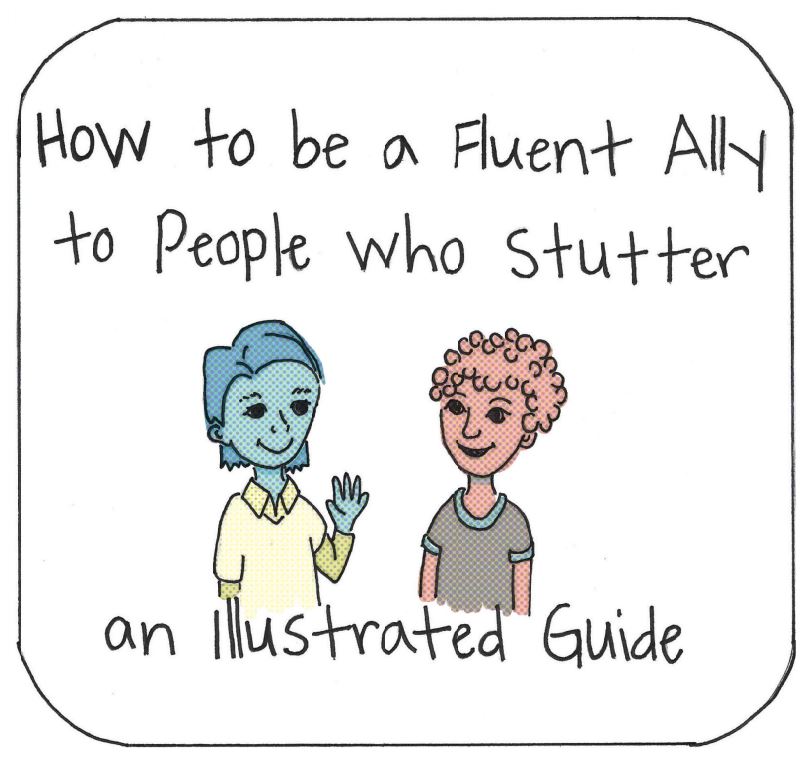
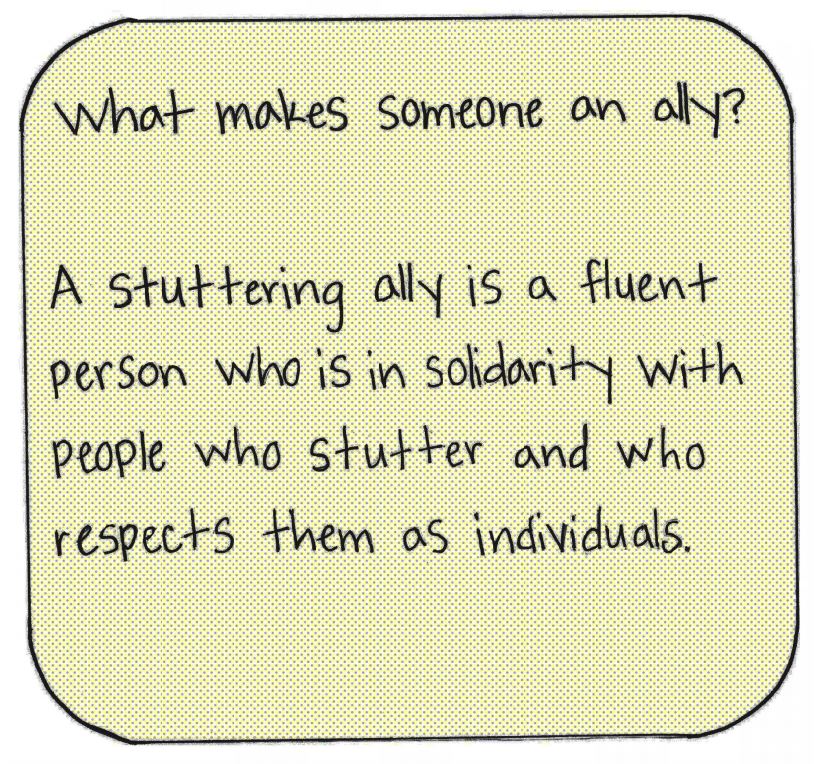
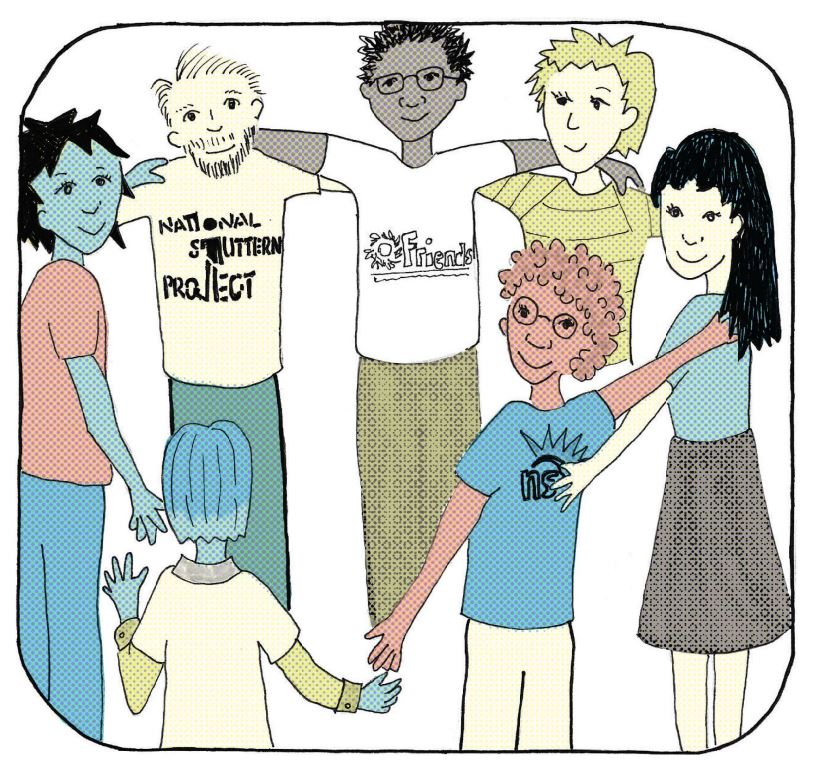
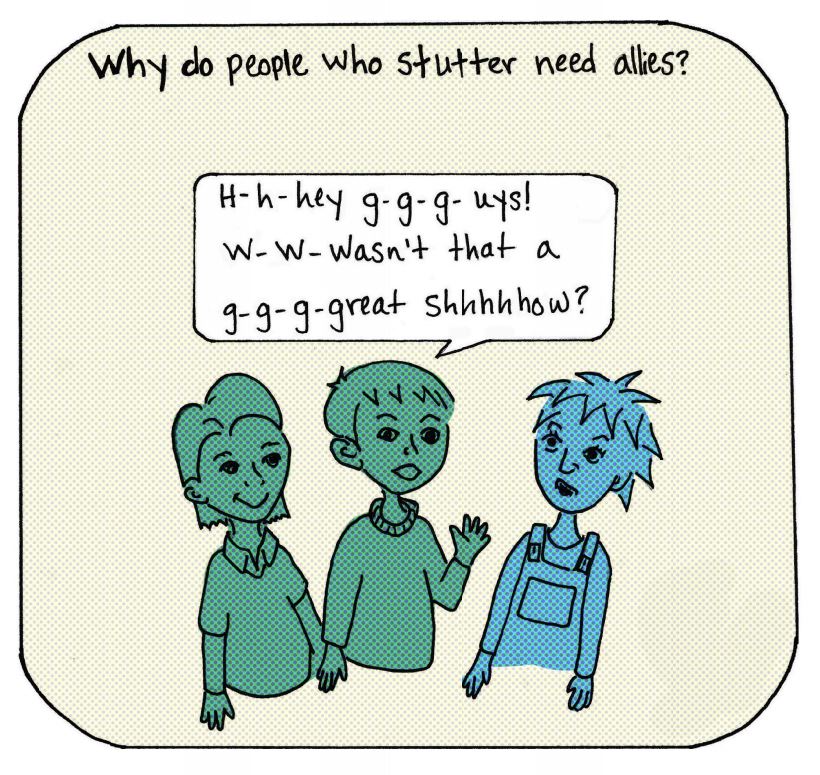
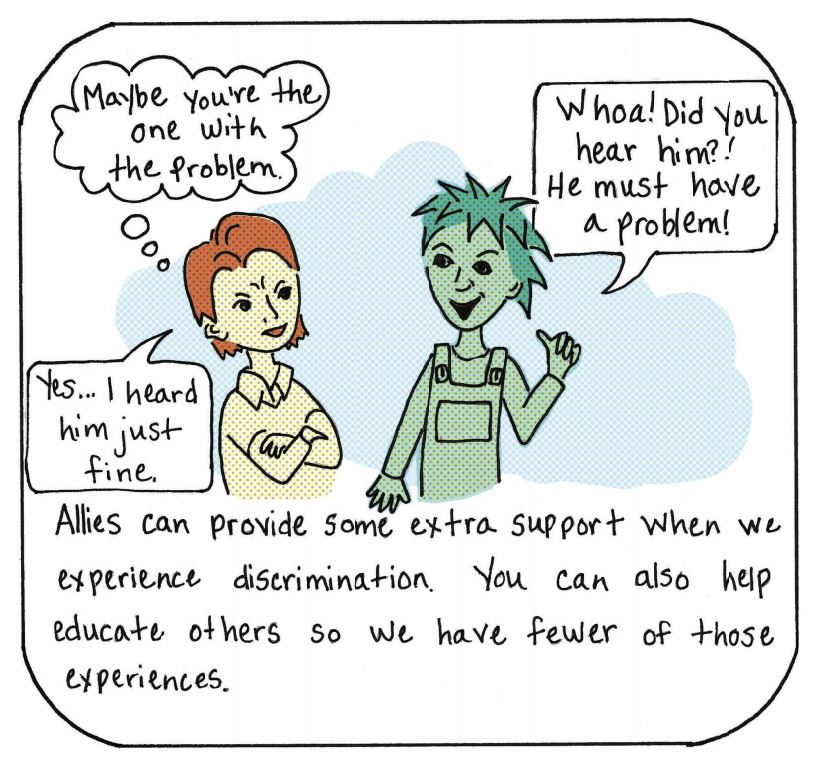
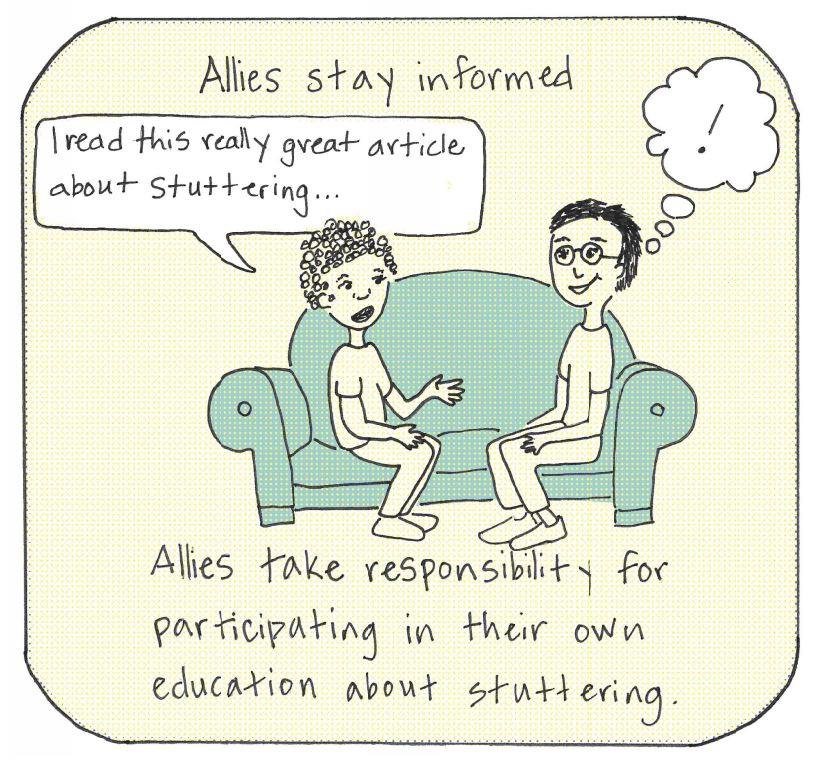
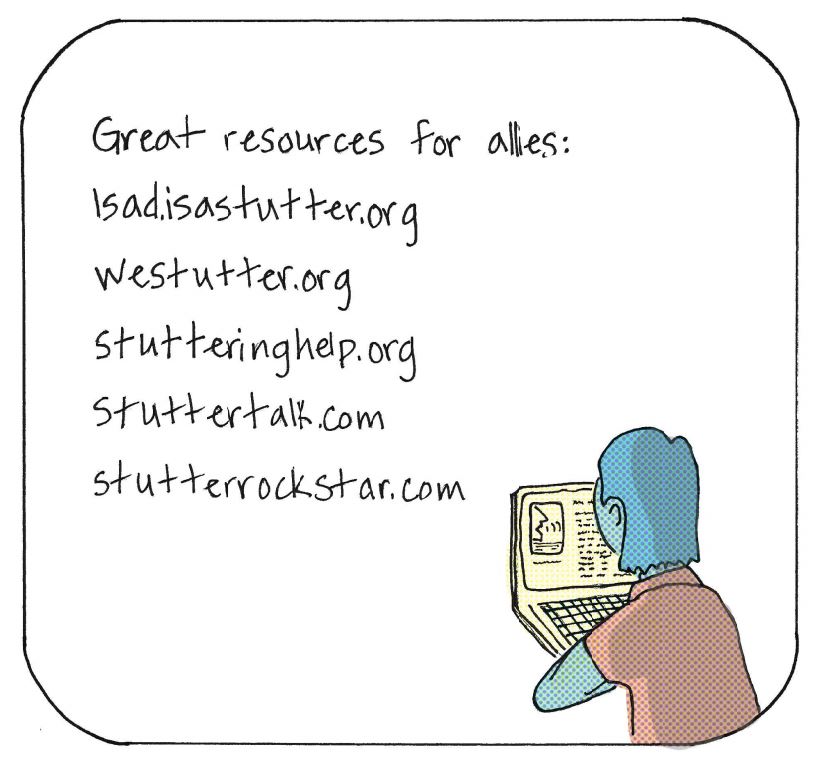
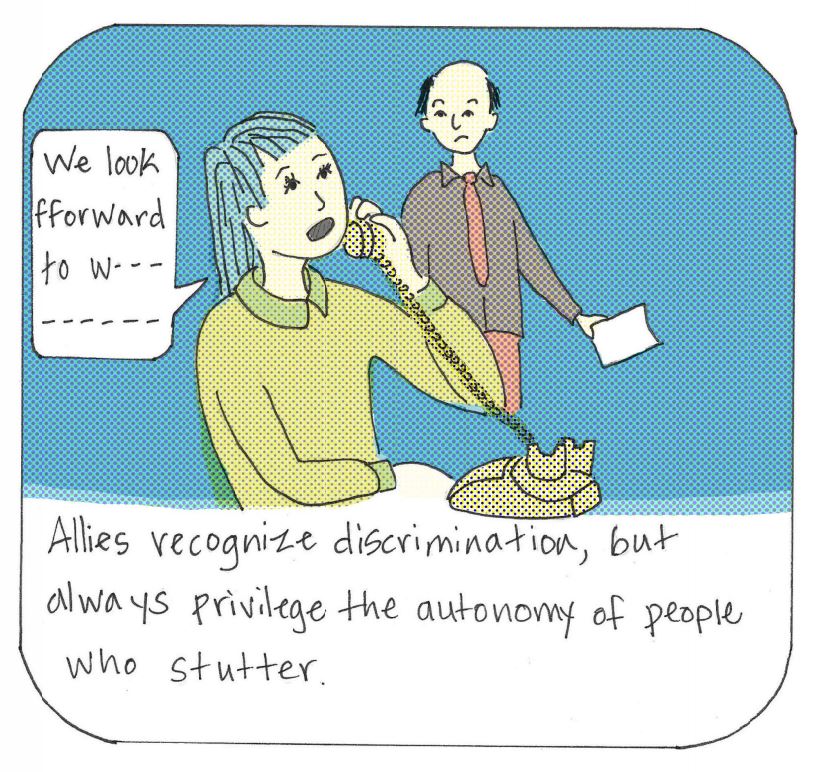
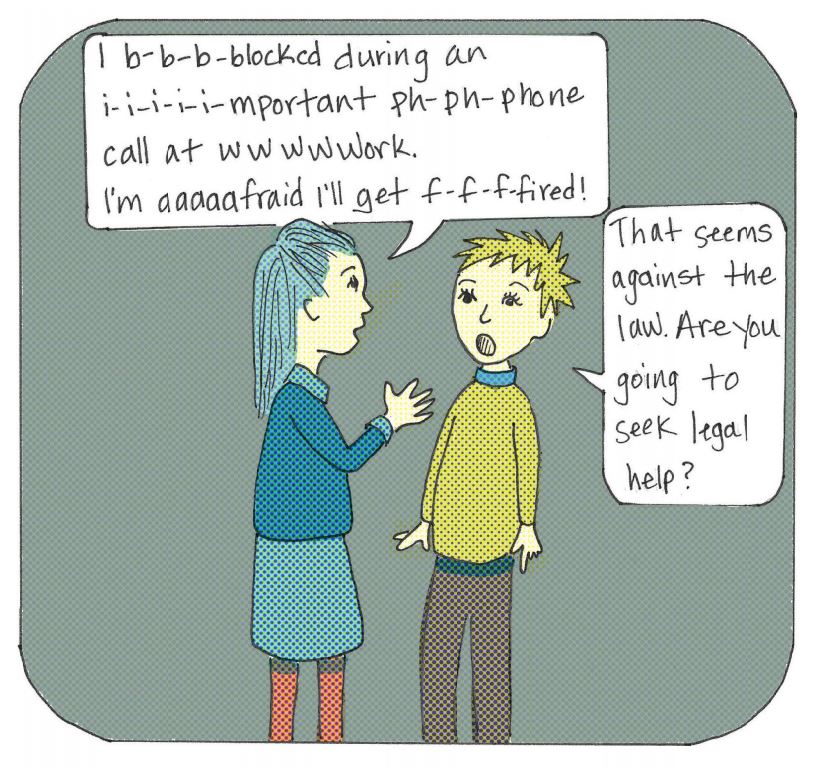
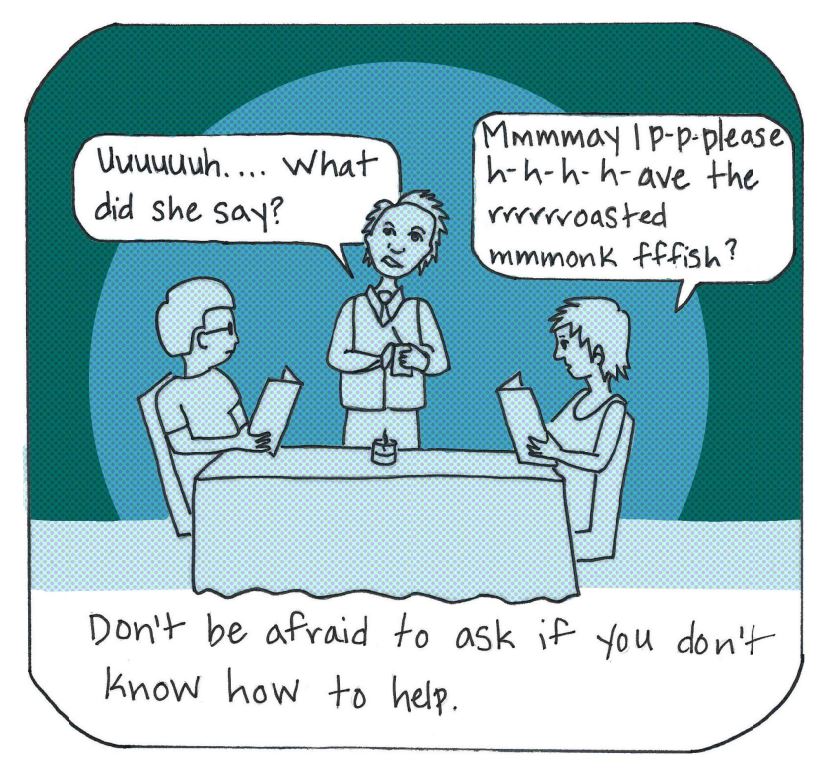
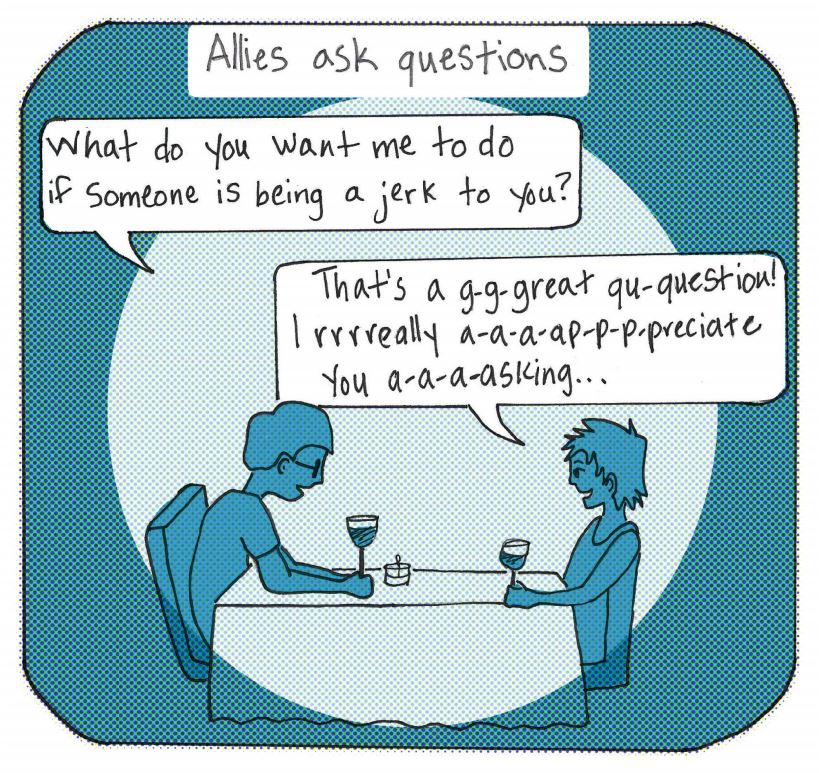
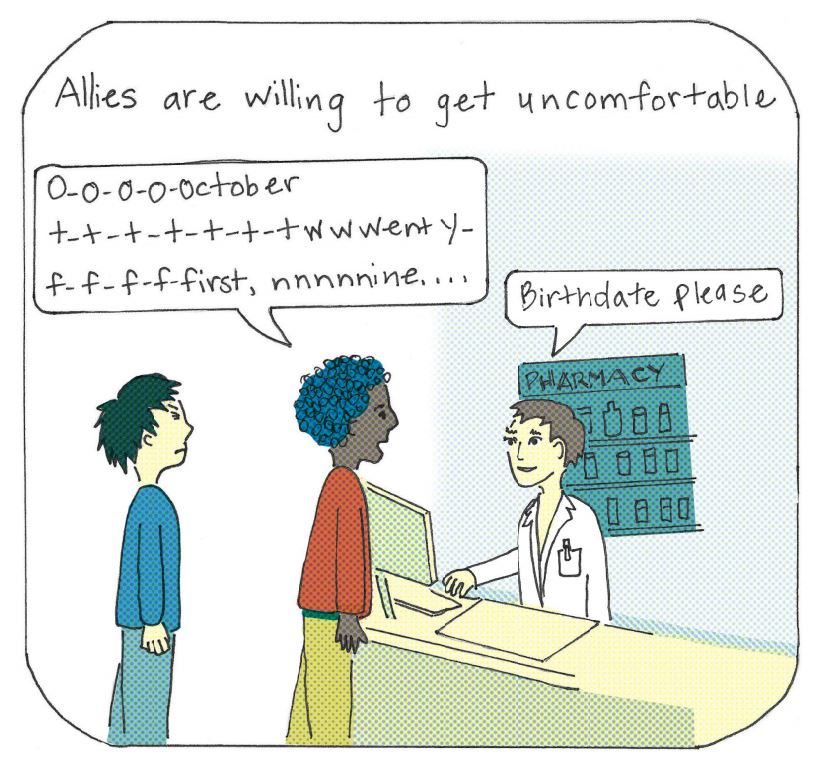
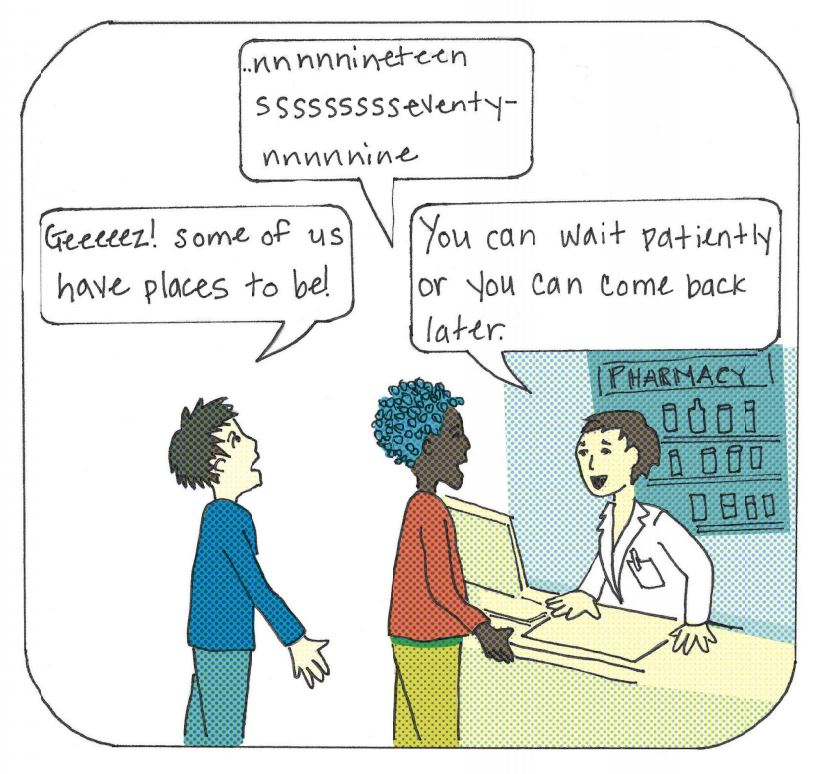
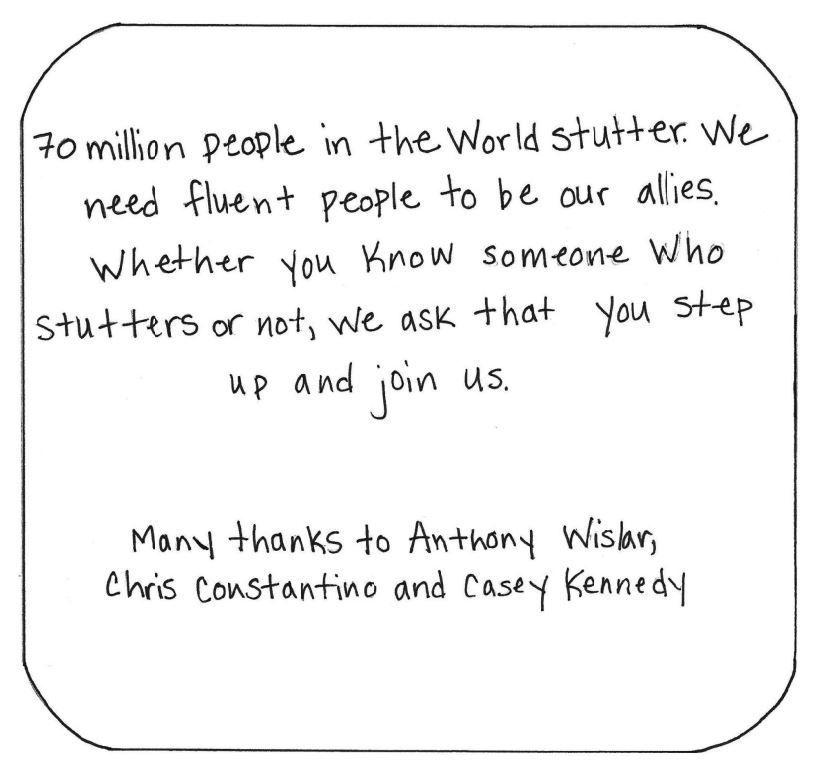
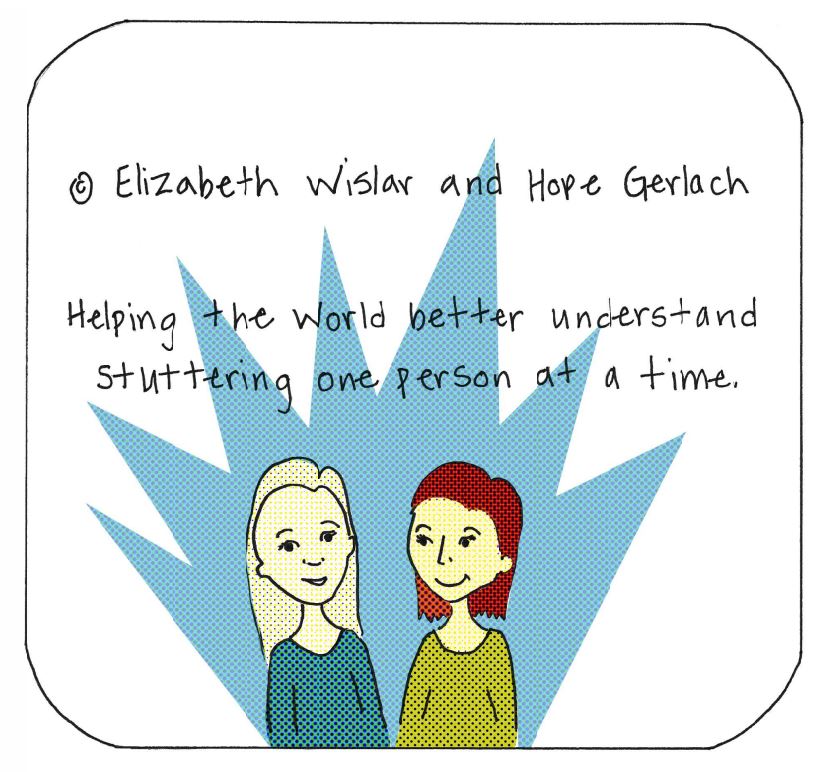
PDF versions are available to download from the following links in color or black and white.
![]()

I love this! I often use the word “advocates” but the word “allies” is so much more powerful. Thank you for this wonderful visual representation!
Hi Ana-
Thank you for taking the time to read our comic. I also like the words “advocacy” & “advocate”, but we decided to go with “allyship” and “ally” for a few reasons. One thing we like about these terms is that they emphasize the role of supportive others doing things with and not for people who stutter. We like the way that the “ally” terms privilege the autonomy and agency of people who stutter.
Thanks for reading and please consider sharing the comic on October 22nd!
-Hope
Elizabeth and Hope – this is wonderful. It is so helpful to have a visual illustration of what it means to support people who stutter. I think the piece that the NSA published on Allies along with this will go a long way towards helping potential allies why this is so important. I remember years ago, my then 15 year old nephew “stood up” for me when my step-father made a negative comment about my stuttering. I am pretty sure my step-father did not mean it maliciously, but he hurt my feelings and my nephew noticed. He said something like, “Hey, that wasn’t cool,” to my step-father. I further heard him remark to his mother why had my step-father been so mean. It was the first time someone in my family had been an ally for me. This is such important work that you are both doing. Thank you.
Pam – thanks for taking the time to read and respond. And thanks for your kind comments. I’m looking forward to sitting down and reading your paper within the next few days. Looking forward to chatting soon.
-Hope
Thank you Pam!
I have honestly learned so much about this from YOU!
Elizbeth
I love this illustrated guide! I am a graduate student in the Speech Language Pathology program and as a person who does not stutter, I am always interested in information on how to be a better advocate or “ally” to a person who stutters. I think a wonderful way to advocate is to educate! Thanks for sharing.
Lindsay- thanks for your comment. It’s so great to know young clinicians are thinking about and getting involved with advocacy. If you ever want to talk more about ways you can get involved with advocacy for people who stutter, feel free to email me at hope-gerlach@uiowa.edu. Please consider sharing our comic on October 22nd!
Elizabeth and Hope,
What a wonderful resource you have made for us “allies”! I love how you use the word “ally”; it provides much more meaning for this type of supporter.
Although I believe this guide is geared more for adults to help other adults, I believe parents could use this resource to educate children too. Perhaps a child has a sibling, friend, or classmate who stutters; the parent could use some of the ideas and examples (or a variation of the ideas/examples) provided in this guide to give the child ways to advocate for their sibling, friend, or classmate during a moment of stuttering.
Bravo! We are one step closer to a world who understands stuttering because of your work.
Thank you,
Sarah
Sarah- thanks for your comment. You bring up some great points and ideas about tailoring examples of allyship to parents and children. Your comment prompted Elizabeth and I to have a conversation about future directions for additional comics. Thank you!
Good job! I think you should make another one. I know Courtney. My name is Stella and I am 10. I stutter. I mostly block and I really like your illustrations. I am wondering, how do you draw that so well?!?!?!?!?!?!? AMAZING 😉
Hi Stella,
Thanks for reading our comic. I know Courtney too! She is a friend of mine. Elizabeth is really good at illustrations, isn’t she? Maybe she can tell you more about how she learned to draw so well, but I bet lots of practice has helped her become a great illustrator. Do you have any talents?
We’re thinking about making another comic that’s just for kids and teenagers. Maybe you could help us come up with some ideas for it. What do your friends do or say that make you feel like it’s okay to stutter? Can you think of a time when a friend or teacher supported you when you were having a hard time with talking?
Thanks for reading our comic!
For your 1st question: I write pretty good stories. I also draw good comics, and I mostly like to draw cyborg cats.
For your 2nd question: My friends say “I’m listening”, “I won’t interrupt”, or “It’s okay”.
For your 3rd question: I once did this really important book report, and I had a SUPER LONG block in the beginning. My teacher asked if anyone could come up and help me, and one person did. Her name was Carmella. We had only 3 minutes to present, and when we were finished, everyone applauded. So in a way, everyone helped by making me feel better.
Finally, you’re welcome!
Thank you Stella! I actually went to art school for college and even though I became a teacher, I still draw a lot.
I want to thank you, because your comment has inspired me and Hope to start a new project!
Thanks for helping Stella contact us Courtney!
From Stella: What grade did you teach while you were a teacher?
I love this! As a graduate speech-language pathology student that just completed a pseudostuttering project, one of my first thoughts was “How do I help?” I am a fluent speaker, but after my experience, I’ve gained a lot of perspective on what it could be like to be a person who stutters. Aside from educating fluent people about people who stutter, I’ve been wondering what I can do in specific situations. This post outlines some great places to start, and also demonstrates that every person who stutters may have different preferences depending on the situation. Thank you!
Thank you for your comment! It’s great to hear your reflections.
That is probably the best take-away! Thank you for your comment.
I loved this! The illustrations really lend a hand to better understanding of the role of allies. I was wondering when a PWS needs emotional support concerning stuttering, what is the best advice or words of support we as allies can offer?
Thanks so much for your insight!
Hi johnsonle2,
Hmm.. good question. I think the best thing you can do is listen to the person and create a non-judgemental space for him or her to talk about stuttering. Then, if the person is open to talking more about stuttering, ask open-ended questions so you can better understand his or her unique experience. For example “How can I support you?” “Is there anything I can do to help?”
I’m sure there are lots of other great answers to your question. This is just the thought that immediately pops into my mind.
What a great tool to help people know how to become an ally to those who stutter. Short, concise and to the point! Excellent job.
Thank you so much, Stacey. We made a printer-friendly version of the comic for people who would like to share this with others. If you’re interested, email me at hope-gerlach@uiowa.edu and I’ll send it to you!
-Hope
This illustrated guide is such a great resource-thank you! The illustrations really add to it and make it even more user friendly! I think this would be a great resource to use when explaining stuttering to family members, teachers, classmates, coworkers, etc. because it not only explains how someone who stutters may feel, but also tells what the individual who does not stutter can do to help. From your experiences, what do you think is the most important thing an ally can do? As a person who does not stutter, it is always so helpful to gain insight on the best way to help!
Thank you for your comments. I think the most important thing an ally can do is exactly what you are doing– ask. Ask the person who stutters what they want from an ally and try to follow their lead.
Elizabeth
Elizabeth and Hope,
I am in my first semester of graduate school at Illinois State to become an SLP and I was drawn to your post because it mentioned creative expression and I thought it would have a good visual. Turns out I was right and your resource is phenomenal!! Thank you for giving me useful examples of how to be an ally. I feel like it will be extremely helpful as I move forward in my professional career to explain these concepts to parents, teachers, clients, and coworkers. I’m not gonna lie, I haven’t had too much experience with PWS, but I’m currently in a stuttering course in graduate school and we had to “pseudostutter” for an assignment for class. It really opened up my eyes to some of the struggles PWS might face and how having an ally in social situations would really help! I have two questions for the both of you: 1. How useful do you think an assignment like “pseudostuttering” is for those training in my field or related fields? 2. What do you think is the single most important thing an ally can do for someone who stutters?
Thanks for this resource again 🙂
Emilie,
Thank you for all your positive comments!
Pseudostuttering comes up a lot in conversations at stuttering conferences and meetings with other people who stutter. I think the consensus is that it can be helpful, but for SLPs to be cautious about thinking they understand stuttering after a few experiences. As a fluent person, you can never really simulate that loss of control or fear of getting really blocked. Nor can you simulate an entire lifetime of experiences. Does that make sense?
As far as the single most important thing allies can do, I am so happy this keeps getting asked. Please ask the people who stutter what they want as individuals. Everyone is going to have a different idea.
Elizabeth
Elizabeth and Hope, you guys know how much I admire both of you for your contributions to the stuttering community. This comic is amazing! I think it would be wonderful to use with families (and friends) of children and adults who stutter. Fantastic work, I will definitely be sharing this one! 🙂
Hi Chani!
Thank you so much. 🙂 We have printer friendly versions too. If you’d like one, just send me an email at hope-gerlach@uiowa.edu and I’ll gladly share!
-Hope
Thanks Chani!!! We will get you a printable version.
I agree with a previous commenter, language is important and the word ally seems to better fit than advocate when you wish to play more of a role as friend as opposed to (just) a professional. Sometimes the focus is just on the PWS in uncomfortable moments or moments of discrimination but I appreciate your commentary on what an ally can do in these situations. It is invaluable to be prepared for these scenarios because they often catch us off guard and result in feelings of regret for inaction or our in-the-moment reaction. Thank you for helping us allies understand how to be good allies!
Thank you for your comment. I agree that we are all in this together.
Elizabeth
Language is important. I really like Ally–thank you for adding your booklet to the list of resources for the stuttering community.
Kindly,
Michael
Michael,
Thank you. It is only because of groundbreakers like you that we are even in a place where we can discuss allys and allyships!
Elizabeth
Elizabeth and Hope,
I absolutely love your way of detailing what an ally is to PWS. I am a first year graduate student at Illinois State University and have loved learning about the importance of becoming an ally to clients, especially PWS, through my stuttering course. In my course, I have participated in a pseudostutter experience, in which I had to stutter in public. Though I am not a PWS, this experience gave me a glimpse into what PWS go through day to day.It has also urged me to want to help those who do stutter.
I think that this could be a great tool to use in introductory courses to stuttering as well as a great resource for teachers to use to increase awareness of stuttering, and to advocate for any students they have that stutter.
I know a lot of my friends who are now teachers incorporate diversity into their lesson plans. I think that this would be a great way to expose kids to stuttering and alliance, in a fun way. The comic is informative and cute!
Have you two ever considered using your comic for that audience?
Using this comic would also be great to share within friends and families who know or have a PWS in their life!
Love, love, love your comic and your contributions to the stuttering community. 🙂
Michelle
Thank you Michelle
Becuase of so many comments like this, Hope and I are planning some follow up projects directed at many of the groups you mention.
Elizabeth
What a wonderful and beautifully-illustrated book with a very important message! My name is Judy Kuster and I have resources about stuttering online on the Stuttering Home Page (www.stutteringhomepage.com) and also on http://www.mnsu.edu/comdis/kuster2/sptherapy.html#library where I have several freely-available Online Books for Children about Specific Speech-Language-Hearing Disorders. I’m wondering if I can have permission to include your book on my resource with proper attribution. It could either be a PDF as it appears to be on this ISAD online conference or possibly made into a PPT or some other kind of an online book that children who stutter, their clinicians and parents would be able to download or simply access online. I suppose I could simply link to the URL of your paper if that is what you would prefer. Please contact me at judith.kuster@mnsu.edu Thank you for your consideration!
Judy,
Thank you for your comment. Hope and I will contact you direclty
Elizabeth
Hi Hope and Elizabeth,
I am currently an SLP graduate student. What a great way to illustrate the importance of fluent allies for people who stutter. The more allies the better! This made me realize how many different frustrating situations PWS have to overcome in their everyday life. Have you ever thought about presenting this to a group of teachers or clinicians? I would love to share this with the other students in my cohort. Also, what do you think the best way (as a future SLP clinician) to become allies with a client who stutters?
Thanks,
Megan
Thank you Megan,
Yes, absolutely share this. I think it would be a great resource for teachers and SLPs. Personally, I think the best thing a clinician can do is ask their client how they can help.
Elizabeth
I love this book! Thank you so much for sharing this illustrated concept in such a way we could share with clients. Speaking of that, is there a way or format we could use this with your permission? There are a limited number of people who stutter on my caseload, but many who need to read this and learn what it means to be an ally! Thanks so much,
Kacie Adkins
Elizabeth and Hope,
Thank you for a wonderful interpretation on such an important topic! I love how you used the illustrations to convey your opinion on what it means to be a good ally for PWS. As a graduate student and future speech-language pathologist, I realize the importance of being an ally for PWS both in daily life as well in my professional career. Thank you for providing this easily understandable and awesome resource for people to build their awareness of stuttering.
Morgan
Morgan,
Thank you for your comments!
Elizabeth
Hi Elizabeth and Hope!
Your illustrations were so helpful in showing what an ally for a PWS should look like! This is definitely something that I plan to share and come back to in the future. I feel that this could be beneficial to share with families of PWS, showing them a detailed description of how to be an ally for their family member.
Do you feel that SLPs can be successful allies to their clients who stutter? What would your recommendations for a soon-to-be SLP be to become an ally rather than just an advocate?
Thanks for sharing!
Marshall
Hi Marshall.
Great questions. I am sure SLPs can be great allies to clients who stutter (and many already are). I think that what makes the word “ally” so special is that it emphasizes solidarity. That, as clinicians, we are working in tandem with our clients and not doing things to them or for them; that we respect that they are the experts on their own stuttering; and that we are willing to do whatever we ask them to do (e.g. pseudostuttering, approaching strangers to speak to them, being vulnerable).
Have a great day!
-Hope
Thanks!
I think listening to what people who stutter want from their allies is the best since everyone is different.
I do think SLPs can be good allies, but they need to remember that not all people who stutter need to see SLPs. That should be completely optional. I also believe that the wants and needs of people who stutter should drive the therapy.
-Elizabeth
Elizabeth and Hope-
This was an amazing presentation on how we can help our friends who struggle with stuttering. I loved the comic format and the simple examples of what we can do to be better “ally’s” to people who stutter. I even showed this to my kids and loved that it was so simple and easy for even young kids to understand. I think by starting with educating young kids we can hopefully change the mindset that this new generation has about PWS. Great job!
Kristen- Thanks for the comment. We agree that starting education early can be a powerful tool to reduce stigma. Hopefully we can make a comic directly for kids in the near future!
Thanks Kristen,
Hope and I also feel the same way. We would love to change everyone’s perception!
Elizabeth
What a fun, simple, and informative piece of information! You knocked it out of the park Elizabeth and Hope. I’m just wondering what your plans are to distribute your illustrations to reach as many people as possible?
Meghan
Hi Meghan!
We’re hoping to get printable versions of the comic uploaded to this webpage soon. Do you have any other ideas to help us reach a wider audience?
-Hope
Elizabeth and Hope,
I am currently a SLP graduate student at Appalachian State University. I loved your comic and respect the ideas it illustrates. I think this would be a wonderful resource for future clients and their families. I was wondering what your favorite thing was about collaborating on this project?
Thank you,
Julia
Dr. Klein is at Appalachian State, right? I’m a bit jealous you get to learn from him! He is incredible.
Also, great question. I have 2 favorite parts. First – it’s been really great to get to know Elizabeth on a more personal level. She has other comics about stuttering and I’ve been a big fan of her work for a while.
One of my favorite comics of hers is here:
https://thestutteringteacher.wordpress.com/2017/02/20/10-most-ridiculous-things-i-did-not-to-stutter/
Second- this collaboration has helped me to develop a greater appreciation for using comics as a story telling tool. Unfortunately I’m not a great illustrator, but I might try to learn!
-Hope
Thank you both so much for taking the time to reply! I love the point you make about utilizing comics for story telling! Yes, Dr. Klein is my professor, and he truly is incredible! His class is my all time favorite, and now the reason for my new love of stuttering!
Julia
Julia,
Thanks! That’s such a great question. Personally, I loved getting to know Hope better. We only met this summer at the NSA conference in Dallas. I’m looking forward to years of friendship and collaboration.
Elizabeth
Hi Hope and Elizabeth,
I love the information one can gather from your illustrations. I always think of ways I can try to make it easier for those who stutter, but begin to second guess my strategies. I don’t want to step on toes or make them feel inadequate because of their speech by bringing to light their stutter. I am a SLP graduate student and consistently learn about the importance of acceptance in the world of stuttering. Is there any advice you would give to family members, or friends, to utilize in order to improve their child’s acceptance of their stutter at home or when they are in public?
Thank you!
Maddie
Maddie,
I can only speak from my own experience, but talking about stuttering is very helpful. When the topic is avoided, it feels like something to be ashamed of. At first it might feel awkward, but the more it’s talked about, the less weird it will feel for everyone. As for advice, I would follow the lead of the person who stutters. For young children, let them know what their options are (making a presentation for the class, talking about it with a group of friends etc.).
Elizabeth
Thank you for creating this illustrated guide. I think it is very practical, easy to follow, and a good way to initiate a conversation with a friend or a relative who stutters. I especially liked the tip about asking the person specifically what they would like the ally to do in certain situations, which takes into consideration each person’s preferences. These tips also seem applicable for people who want to be an ally to anyone who is from a diverse background.
Thanks for the comment!
Thank you!
That is an excellent point.
Elizabeth
Thank you for making this, it’s amazing and very helpful.
Thank you!
Hello, I am an SLP graduate student taking a stuttering class right now. We are often reminded that acceptance is important. This is a powerful message displayed in a fun way. I view being an ally for people who stutter as very important. I like how you remind people that it’s important to ask the person if they would like help. I have a cousin who stutters and his mom has asked me many questions. I have directed her to several of the websites in your story. I will be sharing this with her as well! Thank you for sharing these great tips. Do you have any other tips directed at school-age children in particular?
Thank you for the comment!
Hi!
I really love your comic. Many times in therapy we have an idea about what we want to teach/work on, and then we have to figure out how to make it applicable to our client. It can be even more challenging to make education for family members and the general population interesting and motivational. This is a resource I will definitely be using, as it fits right in with the how-to/life hack/buzzfeed list style inforgraphics being made about anything and everything right now – perfect for children and adults alike! I was curious, what inspired you to choose this format?
Thanks,
Haley
These are all great tips for
Hi Hope and Elizabeth!
I am currently an SLP graduate student in a fluency course. We have been discussing how important it is with self confidence and self acceptance. I love this illustration and think it would be a great resource for everybody. What is the best way to approach a stutterer about advocating what’s best for them?
Thank you!
Hi Bailey,
I think that for SLPs working with people who stutter, one of the most important things is to recognize that each person who stutters is the expert on his or her own communication and experience with communication. We should remind ourselves that each person who stutters already has great ideas about what has and hasn’t worked for them in the past and what will and will not work for them in the future. It is part of our job to create a safe and non-judgemental environment where each person can explore his or her own ideas about what works for advocacy, changes to communication, and anything else related to talking.
Take care,
Hope
Hope & Elizabeth,
This was such a unique and innovative resource! Thank you for providing such helpful examples regarding how to be a fluent “ally.” I especially enjoyed how you focused on asking questions. This shows the individuals who stutter that you care about their independence and value their opinions. This has significantly impacted my understanding regarding how to assist individuals who stutter.
Thank you for your comment. Keep talking about stuttering and stuttering advocacy!
Hello Hope and Elizabeth!
Thank you for this wonderful resource for allyship and advocacy regarding PWS. As a SLP graduate student, I think that this guide illustrates important scenarios and recommendations that can be applicable and useful in all of my encounters with PWS clients. I think that this illustration is easy to follow and has inspired me to consistently advocate for my clients with varying diagnoses in multiple contexts and scenarios.
Thanks you!
Makenzie
Thanks for your comment, Makenzie!
Thank you so much for this incredible resource. I am a graduate student clinician and know that this will be a resource that I will keep and re-examine as I mature and develop as a clinician. The illustrations and scenarios depicted in the guidebook really emphasize the need for fluent allies to be conscious, active and involved when combating prejudiced statements made by people who do not understand stuttering. One of the most powerful aspects of this guidebook is one of the messages it brings to the forefront: allies have to take the initiative to step into situations that might be uncomfortable to truly support and stand in solidarity with a person who stutters. I certainly think this is the area that I need to improve and develop as an ally, as in those tough moments, formulating a clear, concise response to a negative comment can be difficult to accomplish so that the negative statement is refuted, and so that the person who made the comment learns more about stuttering. Seeing calm, clear examples of ways to deal with poor word choices and rude comments was definitely inspiring. Thank you.
Elizabeth and Hope,
My name is Marissa Pardini and I am a graduate student studying speech-language pathology at Appalachian State. I thoroughly enjoyed your story/illustration on how to be an ally to PWS. As I am learning to be an SLP, it will be important for me to have the skills to be an effective ally.
How would you go about teaching these skills to a parents, SLPs, teachers, and other people who work with PWS?
Thank you,
Marissa Pardini
Wow! What a powerful post. I love how the illustrations portray real life examples of when an ally can provide social and emotional support. Do you have any suggestions on how to help a child find an ally inside the classroom?
Elizabeth and Hope,
I am currently a communication sciences and disorders graduate student enrolled in a fluency course. Your piece was very well done. I really like that you both chose the term ally. People who do not stutter will never know the impact it has, but we still have a responsibility to share what we know, to educate others. You’re guidelines were straight to the point, and now I have no excuses! Thanks for posting this and keeping people who don’t stutter accountable for making the world aware of stuttering.
Elaine
Elizabeth and Hope,
I love your piece! I appreciate that you chose “ally” as opposed to “advocate” as it conveys a much more personal relationship. This comic is an approachable and accessible resource to promote “allyship” to PWS. I can see how it could possibly be translated into use with parents and children, and (based on the comments above) it seems like you may have plans to create something along those lines. I look forward seeing it!
Thank you,
Gina
This was an enjoyable and informative comic to read! This comic is great to help educate family members and friends of PWS on what they can do. I am currently in my second year of the speech language pathology program at Appalachian State University and will graduate in may. Do you have any additional resources I can turn to for when I am working with a PWS?
Thank you!
As a graduate student studying speech-language pathology, and currently taking a fluency disorders course, I am learning so much about stuttering and becoming an advocate for people who stutter. Now I can say that I am becoming an ALLY for PWS! This comic was a great guide to ways that I can become a true ally. Thank you for including some great resources to websites that can provide me with ways to further educate myself about stuttering. I enjoyed visiting these websites and will keep them handy as I continue participating and learning about stuttering. I saw that you are sharing a printable version of your comic. I would love to have a copy of the comic to share with others in my community. My email is mellcass@isu.edu
Thank you!
I think it’s wonderful that you’ve created a visual display of how to be an ally. I am always trying to create better visuals to draw people into research and convey a point; this was fantastic! I would love to know more about what inspired you both to create this and how you came up with the basis for these ideas.
I’ve been looking for an article like this!!!!
As I’ve read through several articles, I’ve learned that I want to be an ally to people who stutter, and that it’s important to be an ally to people who stutter, but I didn’t know HOW.
So thank you for creating this simple yet inspiring comic!
My favorite example in this comic was that of the pharmacist who supported the person who stuttered. Before I read this article I was thinking that I needed to be any ally to the people who I personally know who stutter. But it’s just as important to be an ally with people you don’t know who stutter. Just like the pharmacist didn’t know the person who was stuttering. She stood up for him and was clearly educated in the matter.
I would love to share this with family and friends of people who stutter. I think it’s so important that people know what they can do to be an ally. Because it’s all too easy to feel helpless.
Thank you for this wonderful and creative interpretation.
Nikki
I love this!
Although I cannot relate to the emotional and social aspects of stuttering on a personal level, I have a lot of empathy towards those who have to deal with the stigma on a daily basis. I find myself wanting to step in and advocate in many situations, not just with stuttering instances. Sometimes it can be difficult to judge whether or not it’s appropriate to act as an ally. This article made me see that it’s always appropriate to be an ally. The best way to be one is to ask the person who stutters how I can be of help. It always seems like such an awkward concept, but in reality it’s just human. Thank you for your upfront and powerful message!
Thank you for creating this wonderful guide! As an ally, I find this guide helpful and informative as it shows how to be an ally. I think it would be great to see a guide adapted for children. I see that one may be in the works as you indicated in one of the comments above that both of you are thinking about it. I think it would be a great resource to share with children who have a classmate who stutters.
Thank you again for creating this!
-Amanda
Elizabeth and Hope, Thank you so much for this–it is really wonderful and I have shared it with the students in my grad and undergrad fluency courses.
Jean
Elizabeth and Hope,
Your work is so very well done and though out. I love how easy it is to read and apply. The illustrated format makes sharing awareness very approachable. I love that you can down load this and use it anywhere at anytime!!
Hi Elizabeth and Hope,
Thank you so much for sharing this guide for how to be an ally for people who stutter. As someone who does not stutter, I found this to be extremely informative and I actually shared it with some of my friends because I wanted them to be informed as well. I think educating others on ways to appropriately help and interact with a person who stutters is extremely important and this guide does just that! Educating others puts us one step closer to reducing the stigma associated with stuttering and I love that you came up with such an easy to understand way to do that.
Thanks again,
Melanie Webber
I absolutely love this comic and think that it is an awesome resource that I would definitely use in the future. As a current speech language pathology graduate student, I am always looking for new tips on how to be an ally to PWS. I particularly liked the tip of not being afraid to ask the PWS if you don’t know how to help. Everyone is different, so all PWS will have their own individual preferences as to what they find most helpful.
I would like to echo the response in comments that I think other comics geared toward children and teenagers would be a great idea! I am planning on working in the schools after graduation, and I would definitely use a tool like this with students.
Hello Elizabeth and Hope,
This is such a wonderful resource. Thank you so much for creating it! I am in grad school to become and SLP, and currently work as an SLPA. I use visuals like graphic novels in my work A LOT, but it can be very difficult to find resources like this that support the families/friends of my clients, and expand their education on what their loved one might be going through. I especially loved the date/restaurant scenario; a wonderful application of real-world situation that could be made easier for a PWS with a little education for their allies. I will definitely bookmark this for the future.
Hi Elizabeth and Hope,
Thank you for a great contribution. I have used the term “advocate,” but your paper has influenced my thinking around this very important topic. I am adding the powerful word “ally” to my vocabulary, as a school SLP, person who stutters, and ally of children who stutter. Best to you both,
Rob Dellinger
Thank you for sharing this visual representation of what it is like to be an ally to someone who stutters. I am currently in graduate school at Edinboro University of PA, studying to become an SLP. You have done a wonderful job of illustrating many real life situations where people who stutter would benefit greatly from having an ally to support them when these social/emotional aspects of stuttering become apparent. Allies need to be willing to take initiative and stand up for PWS, but also understand that they are not there to protect, shelter, or take control of the situation. PWS are capable of anything fluent people are capable of, but allies can provide PWS with the emotional support they may need as well as assist them in educating others about stuttering. There are many people in the world who do not understand stuttering, and I believe that PWS and their allies have the right and the responsibility to inform those people in order to create a more accepting society. This is a very influential piece. I will definitely keep this story to refer back to as I continue my studies and begin my work as a clinician. I’m sure it will be a great tool to remind myself of what it means to be an ally to people who stutter and to educate my future clients’ families and friends what it means, as well.
Thank you!
Jordan
Thank you for creating this visual guide, Elizabeth and Hope! In the age of The Oatmeal and Hyperbole and a Half, this is the perfect medium to reach a younger audience who would be in contact with PWS at a particularly vulnerable age. It’s also a convenient format to convey an important message in a succinct manner. Each panel seemed to anticipate questions/concerns generated by the preceding panel (e.g. privilege the autonomy, ask if you don’t know how to help, etc.). I like the term ally, too, as opposed to, say, advocate. It connotes a more peer-like status, rather than ability assisting disability.
Hello Elizabeth and Hope,
Thank you for posting this “how to” be an ally for someone who stutters. Often it is discussed how people should be an ally or advocate. But I like how your guide actually describes some specific ways you can be an ally i.e. providing education, standing up for someone who stutters if someone teases them, etc.